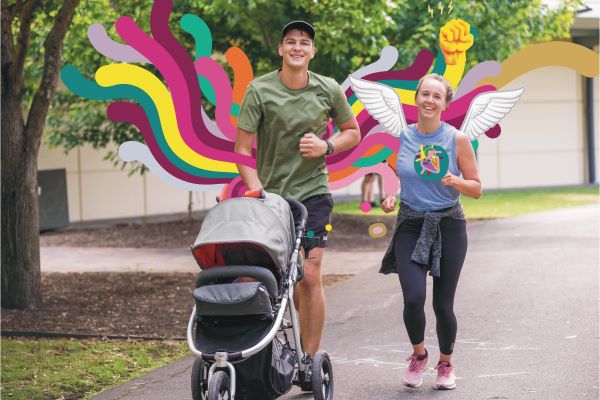For Alexandria “Alex” Holt, volunteering has always been more than a hobby — it’s been a daily part of her working life.
“It feeds my soul,” she says. “Actively helping my beloved community alongside like-minded peers, I’ve come to find, is emotionally and spiritually rewarding.”
Most rural towns will tell you that volunteers are the lifeblood of the community. In Alex’s town of Wedderburn, Central Victoria, it’s no different. Her various volunteer gigs — helping out in the kitchen at the Lions Clubs or taking a shift at the tourist centre — only strengthen her ties to the community and enrich her experience of rural living.
It’s no surprise then that volunteering — the act of giving time or labour freely — reaps enormous mental, social and even physical benefits.
Many of us might be new to the idea of volunteering and curious about how it can add to our often busy lives. Here we cover off the many health and wellness rewards that giving back can give.
Build your social ties
Volunteering is a richly social activity. Doing it means you not only have the opportunity to make new friends, but also build another support network into your life.
Wedderburn sits off the beaten path, so staying connected to others in this farming town is incredibly important to Alex. Volunteering is one way to make sure that social ties are made and kept.
“The organisations I volunteer for are ones that contribute to the beautification, health and tourist promotion and improvement of my small rural town,” she says. “They also mean I always stay connected.”
When giving time for a shared community cause, the bonds you make may sometimes be more meaningful than others in your life, like your workplace. When you spend time with others to better something, you grow stronger interpersonal connections by your shared values and personal beliefs.
The time and work can vary — from beautifying natural parklands or helping out at a community working bee — but the deep social connectedness remains the same.
Improve your mental health
According to Health Direct, volunteering can help combat stress, loneliness, social isolation and depression.
Research has also found that those who give their time for something are usually happier and healthier than those who don’t. In particular, those who volunteer usually have better mental wellbeing. The reasons are because volunteer work:
- combats issues like depression and anxiety
- makes us feel better about ourselves by improving our self-esteem
- adds greater purpose to our lives sometimes not found in other things like employment.
This experience isn’t lost on Alex. She says that her volunteer work “fills me with positive energy and personal satisfaction that inspires me to continue volunteering”.
Giving selflessly makes us feel good and it applies across the board. From those working with animals, helping during a disaster or contributing to the tourist centre as Alex does, it helps us feel more content with ourselves.
Plus, when we feel good, we’re more likely to continue giving, so the cycle continues — to the benefit of us and a worthy cause.
Volunteering can also mean you help put any stress to one side. When directing our mind to something worthy and selfless, we can reduce stress levels that may sit elsewhere in our life, like with work or family. Our focus is on an external goal, one with a safe support network and a meaningful outcome, that can make us feel better and less preoccupied by other stress.
Better your physical health
Many studies have found that kindness, compassion and giving are associated with a stronger immune system and even a longer life.
The physical nature of volunteering is what’s key. Volunteers generally walk more and find it easier to tackle everyday physical tasks, which means they keep more mobile than some of us. Getting active can mean you enjoy a lower risk of high blood pressure and higher fitness levels.
“Volunteering is actually the best kind of exhaustion,” Alex says. “It’s sometimes quite tiring work, but after each day you retire with a full cup and sleep soundly.”

parkrun towards rewards
You can now earn 500 Live Better rewards points when participating in 1 or more parkrun events in a month. Open to eligible members with Live Better rewards. Register for parkrun and link your Medibank membership to your parkrun account to start earning, and don't forget to scan your linked parkrun barcode ID at the finish line.*
Learn new skills
Taking up volunteer work can also help you develop new skills. This can range from professional knowledge, such as managing a budget or engaging with government for grants, to any physical skills like food preparation or gardening.
According to Lifeline, its volunteers experience many benefits, including developing new skills and experience for personal and professional growth.
Volunteering might help you consolidate some talents you may already have, or access training in something else of value. For example, if you have administrative or project skills, you could help plan and manage a raffle for a community group. Doing this can make a meaningful contribution and offset a job someone else may be less comfortable managing.
In Alex’s case, keeping her first aid training in check has been a real gain. Volunteering so regularly — and across different organisations — has meant she’s been able to keep it up to date: “I take a lot of pride in ensuring my first aid knowledge is current, so I can deliver the best quality service to our organisation.”
Create balance in your life
There may be an irony in saying that adding to an already busy schedule can lead to better balance. But for some it’s true.
If you’re busy with work and family, volunteering can still be both relaxing and energising for you. It doesn’t need to be a big time commitment either. This is all because of the benefits above, such as improved mental health and lowered stress, but also a sense of grounding and purpose — in and amongst the unnegotiable demands of life.
Alex even ranks her volunteer higher than her day job. “Volunteering is actually more rewarding than paid employment,” she says, “because volunteering by its very nature is a choice. You choose to contribute to a club or organisation with the objective of improving the outcomes of the group.”
She also adds this advice: “I would recommend every person to find one way they can contribute to their community in a volunteer capacity. Undoubtedly, the rewards will fuel your spirit to keep giving.”
How to get started
There are many organisations and causes out there worthy of your time. Volunteering can range from small gestures (giving blood) to bigger commitments (sitting on a board).
Begin by deciding on what’s important and workable for you.
If you have a desk job and want to spend more time outdoors, you might consider volunteer work that happens outside. Or if you find that your job is already physically demanding, you could offer your time in a less active way. For example, to act as a career or life mentor and provide support remotely.
You should also think about your interest and your goals. Setting out what these are and what organisations are important to you will ensure you find any volunteer work rewarding and enjoyable.
Volunteering Australia has practical information to help you get started as a volunteer — whatever that looks like you for. There’s also Go Volunteer, an online database that lets you find opportunities in your area.

